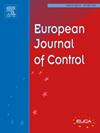Non-overshooting quasi-continuous sliding mode control for second-order systems
IF 2.6
3区 计算机科学
Q2 AUTOMATION & CONTROL SYSTEMS
引用次数: 0
Abstract
This paper proposes a nonlinear sliding mode state feedback controller for perturbed second-order systems. In analogy to a linear proportional-derivative (PD) feedback control, the proposed nonlinear scheme uses the output of interest and its time derivative. The control has only one free design parameter, and the closed-loop system is shown to possess uniform boundedness and finite-time convergence of trajectories in the presence of matched disturbances. We derive a strict Lyapunov function for the closed-loop control system with a bounded exogenous perturbation, and use it for both, the control parameter tuning and analysis of the finite-time convergence. The essential features of the proposed control law is non-overshooting despite the unknown dynamic disturbances and the continuous control action during the convergence to zero equilibrium. Apart from the numerical results, a revealing experimental example is also shown in favor of the proposed control and in comparison with PD and sub-optimal nonlinear damping regulators.
二阶系统的非超调准连续滑模控制
针对摄动二阶系统,提出了一种非线性滑模状态反馈控制器。与线性比例导数(PD)反馈控制类似,所提出的非线性方案使用感兴趣的输出及其时间导数。该控制只有一个自由设计参数,并且在存在匹配扰动的情况下,闭环系统具有一致有界性和轨迹的有限时间收敛性。对于有界外源扰动的闭环控制系统,我们导出了一个严格的Lyapunov函数,并将其用于控制参数的整定和有限时间收敛性的分析。该控制律的基本特点是在存在未知动态扰动的情况下不超调,收敛到零平衡点时控制作用是连续的。除了数值结果外,还给出了一个具有启发性的实验实例,并与PD和次优非线性阻尼调节器进行了比较。
本文章由计算机程序翻译,如有差异,请以英文原文为准。
求助全文
约1分钟内获得全文
求助全文
来源期刊

European Journal of Control
工程技术-自动化与控制系统
CiteScore
5.80
自引率
5.90%
发文量
131
审稿时长
1 months
期刊介绍:
The European Control Association (EUCA) has among its objectives to promote the development of the discipline. Apart from the European Control Conferences, the European Journal of Control is the Association''s main channel for the dissemination of important contributions in the field.
The aim of the Journal is to publish high quality papers on the theory and practice of control and systems engineering.
The scope of the Journal will be wide and cover all aspects of the discipline including methodologies, techniques and applications.
Research in control and systems engineering is necessary to develop new concepts and tools which enhance our understanding and improve our ability to design and implement high performance control systems. Submitted papers should stress the practical motivations and relevance of their results.
The design and implementation of a successful control system requires the use of a range of techniques:
Modelling
Robustness Analysis
Identification
Optimization
Control Law Design
Numerical analysis
Fault Detection, and so on.
 求助内容:
求助内容: 应助结果提醒方式:
应助结果提醒方式:


